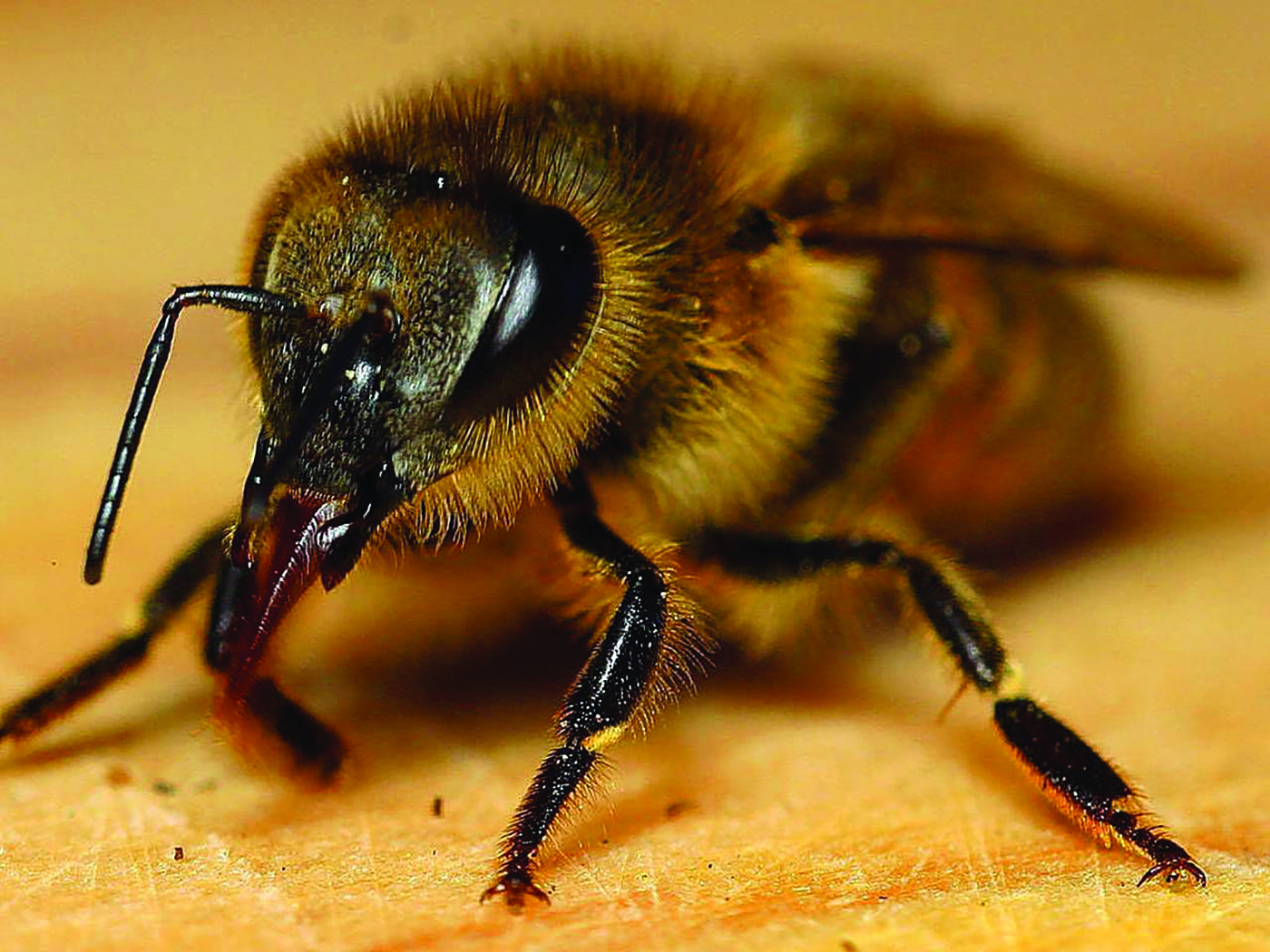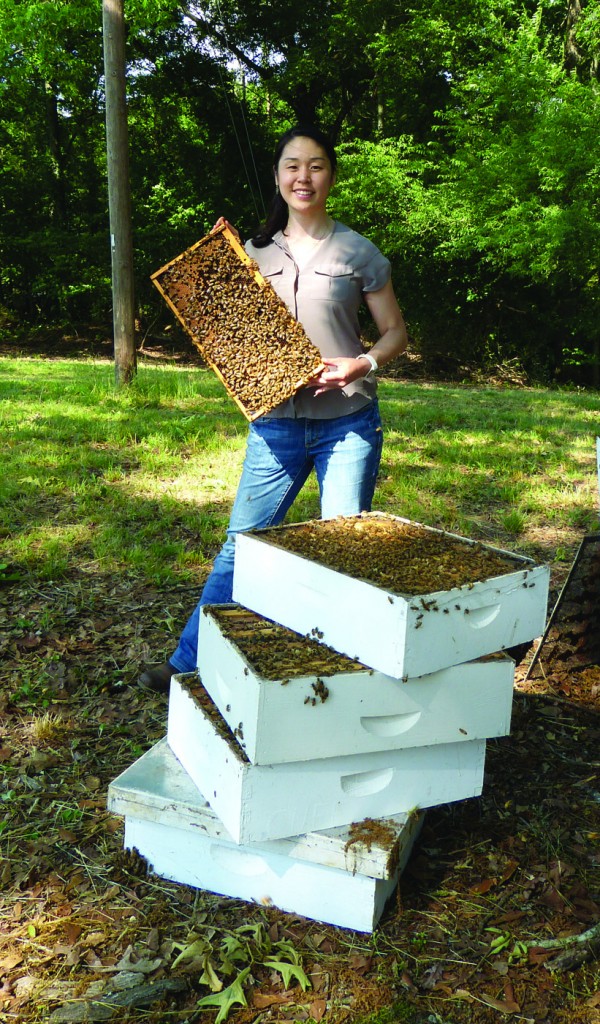Tidy bees are healthy bees
by Peter Kent
 When it comes to grooming, some honeybees are more fastidious than others. Image courtesy of Jon Sullivan.
When it comes to grooming, some honeybees are more fastidious than others. Image courtesy of Jon Sullivan.
As premier pollinators, honeybees help feed the world. But something is eating them.
Can genetics help produce kids who have good grooming skills and prefer clean rooms? For now, that remains a parental dream, but it could be a reality for beekeepers. Research shows that tidy bees are healthy bees.
Clemson’s new beekeeper, Jennifer Tsuruda, is part of a worldwide effort to identify honeybee behavior and genes that appear to make some bees better groomers than others. The good groomers are better at ridding their bodies and hives of Varroa mites, which can wipe out the honeybee colonies that help put food on our tables.
“Pollinators are involved in producing one third of the food we eat,” Tsuruda says. “Bee research is a matter of food security—national security.”
There are many kinds of mites, but the one that is the most serious problem is aptly named Varroa destructor. About the size of a pinhead, oval-shaped and reddish brown, the Varroa packs a double whammy on honeybees.
 Jennifer Tsuruda studies ways to control mites with better housekeeping from the bees. Image courtesy of Jennifer Tsuruda.
Jennifer Tsuruda studies ways to control mites with better housekeeping from the bees. Image courtesy of Jennifer Tsuruda.
Hungry hitchhikers
A mature and mated mite female finds a honeycomb cell containing an immature bee to infest and feed upon. She produces a son and daughters who mate and feed on the developing bee, resulting in mated females that start the cycle over again. The feeding may or may not kill the gestating bee, depending on the number of mite babies and the viruses vectored by the mites. But that is not the end of the parasitical feast. The young mites leave the cells and climb aboard adult bees, feeding also on their hemolymph—bee blood.
Feeding their young off the bees is harmful enough, but the mites do even more damage. They also harbor viruses that carry lethal bee diseases, causing parasitic mite syndrome, which can devastate bee colonies. But not all bees or colonies succumb to the Varroa mite.
Some bees work harder at grooming—using their legs to knock mites off their bodies. Others can tell when capped honeycomb contains mites and uncap it, a behavior called Varroa sensitive hygiene (VSH), which can kill the mite offspring and disrupt the mite’s reproductive cycle. Tsuruda and other bee researchers single out the overachievers (and underachievers), analyze their genes, and breed them to develop mite-resistant colonies of “mite biter” and VSH strains of honeybees.
Starting with the queen
Tsuruda works with researchers and beekeepers who breed queen bees—the only egg layers in bee colonies—to focus on building bee stocks that are vigorous housekeepers.
“I don’t think we will ever get rid of Varroa mites, but we can develop honeybees that have a better chance of managing infestation levels,” Tsuruda says, adding that the genetic option brings other plusses.
“Traditionally, we have used non-genetic options, like removable drone comb and chemicals to control mites, but the chemical controls raise concerns,” she says. “The mites could become resistant to overused pesticide, and there needs to be more long-term research on conventional chemicals and biopesticides.”
As Clemson University’s Extension apiculture specialist, Tsuruda divides her time between research and extension, which involves holding public education programs and meeting beekeepers. She works with the state’s 3,500 beekeepers, who tend to about 33,000 hives. The value of pollinated crops nationwide is about $20 billion and more than $25 million in South Carolina. Palmetto honey alone brings in more than $1.25 million.
You could say she has been as busy as a bee.
Tsuruda has talked with local beekeeper associations around the state and in neighboring states, organized a pollinator week celebration, taught beginning beekeeping classes at Roper Mountain Science Center in Greenville, showed 4-H campers how bees are similar and different from people, hosted a honey tasting on campus, and participated in the South Carolina Beekeepers Association annual meeting at Clemson in July.
Pollen stewardship
She also is working with Clemson Regulatory Services and Clemson Public Services on their bee reporting system, a part of the division’s pollinator stewardship project. Beekeepers can report hive sites online, alerting pesticide applicators to bee locations.
Nationally, Tsuruda is working on the American Bee Research Conference as the vice president of the American Association of Professional Apiculturists, and is serving the Entomological Society of America as chair of a committee that serves young professionals.
Apiculture is one thing and culture is another. A California native is learning the lay of land.
“I’m adjusting to and enjoying the slower pace of life out here, except for the speed limits,” Tsuruda says, laughing.
Jennifer Tsuruda is an apiculture specialist in the Clemson University Cooperative Extension Service. Peter Kent is a news editor and writer in Clemson’s Public Affairs Activities.


